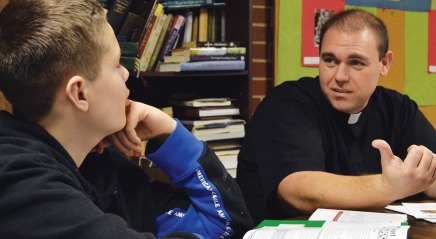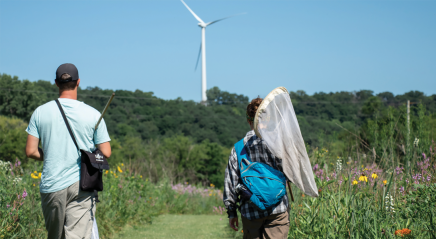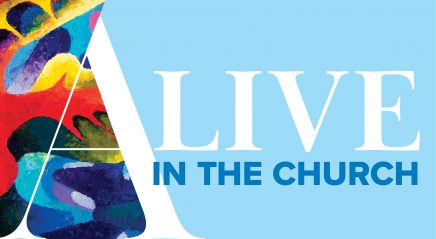Grace Hoening, like most 2020 high school seniors, ended her secondary education career in an unprecedented way: isolated from her peers, missing out on a “normal” graduation ceremony and trying to prepare for an uncertain start to college in the fall.
This was not at all what she had expected.
But this past summer, the 18-year-old graduate of Rockford (Ill.) Lutheran High School and nearly 50 other recent graduates found Passage—a new ELCA young adult small-group program that allowed them to express their feelings and talk about their faith.
“We talk about life, what changes are going to happen and what we expect to see differently about our lives, and about how we’ve gone through this—because COVID obviously wasn’t expected,” said Hoening, a member of GPS Faith Community in Machesney Park, Ill. “People I’m in the group with are all across the U.S., so knowing it’s not just me, it’s all of us together, that’s comforting.”
Passage was created to help high school graduates connect with peers and young adult leaders during a major time of transition in their lives: the summer before they begin college, technical school, military training or other life adventures.
“Those transitions are very, very important,” said Lamont Anthony Wells, ELCA program director for campus ministry. “When you look [at] how cultures across the world behave, they do well with transitions. It goes back to … rites of passage, like bar mitzvahs. … We have confirmation, but many of our kids in recent decades have lost interest or true connection, and we want to revive that, and we believe that happens in transitions and critical parts of our lives.”
Passage brought together small groups of five to seven recent high school graduates from across the country and allowed them to “meet” once a week digitally, through Zoom or Google Meet, to talk about life issues: how it felt to leave home and enter dorms or military bunk rooms, how to find a new church family, how to engage their faith with others learning to do the same, and more.
The groups were led by a young adult leader—typically a college student involved in Lutheran campus ministry—who provided videos and advice as they mentored and coached their groups for six weeks.
“They have had some really meaningful conversations with the people in their group,” said Savanna Sullivan, ELCA program director for young adult ministry. “[The students have said], ‘I’ve been looking for a place where I can express some of my excitement and frustration with how my senior year went or how I expected it to go.’”
Ashley Karas, an 18-year-old high school graduate and member of Good Shepherd Lutheran Church in Green Bay, Wis., was one of those students. She found Passage enjoyable because of the organic conversations she had with peers.
“[We discussed] what are we afraid of going into the future, and how can we help each other when we have the same questions,” said Karas, who plans to study premedical biology at Luther College in Decorah, Iowa. “College can be really daunting, especially in the time we have now, but it’s comforting to know I’m not the only one with these worries. [My group peers] are from North Dakota and Arizona, but I’m not the only one with this experience. … It’s easy to bond over shared fears.”
Lasting connection
COVID-19 may have been a catalyst for Passage, but ELCA leaders had already identified a gap between such otherwise solid programming as the ELCA Youth Gathering and Lutheran Campus Ministry programs.
“COVID clarified and crystalized and sped up the offering of this [program] as a way to combat the issue that already existed,” Sullivan said. “It’s really hard to connect people who recently graduate from high school to their next journey in faith.
“Our campus pastors were saying this too. How can we be a resource to people who are leaving their high school youth groups or haven’t been involved in high school youth group but are having big questions of faith and specific challenges they’re facing in this moment?”
Wells and Sullivan both believe the program has a bright future. “The feedback we’re getting right now is this Passage program allows the student to feel a sense of stableness, like someone’s walking with them through this process,” Wells said. “We’re sensing that they may want this to continue.”
Karas has already experienced a deep connection with her Passage peers.
“My group has grown to be a family,” she said. “Many of us will join [a meeting an extra] five to 10 minutes just to catch up with one another, even though we have never met in person. … Our time together tends to fly by because we don’t have to try and impress the others. It’s a safe place to be yourself and everyone just wants to support one another. We know the future is scary, but we are all taking the leap together and our community is ready to catch us if we need it.”
The program shouldn’t have any problems expanding. Wells said he had to turn away college volunteers because there were more potential young adult leaders than students registered for the program.
“We’ll definitely do this again next summer,” Sullivan said. “We’re really hoping this ministry can gain traction—that this is something high school seniors can look forward to being a part of in the summer after their senior year.”









